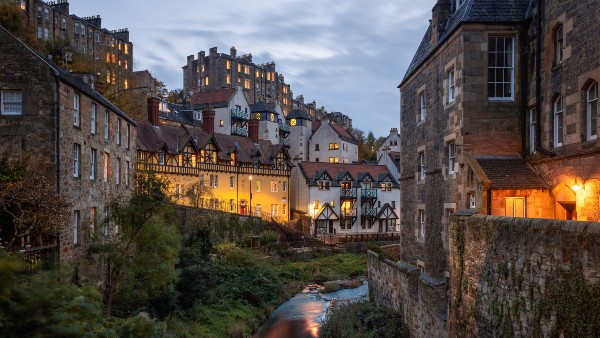Join us for a wide-ranging discussion on issues relating to the environment and land use in Scotland.
All are welcome to this event, where the discussion will be centred around the Scottish Government “Vision for Agriculture” document, other related policy consultations, and SEDA’s report of “A New Vision for Land Use in Scotland: 6 Conversations”, all as part of a wider conversation about issues relating to the environment and land use.
This event will be one of two that will precede a full day conference in March, details of which will be released soon.
The context for this event is both historic and topical. The RSA’s long-standing interest in environmental and rural issues dates back to the excellent Countryside Conferences initiated by our late President, HRH The Duke of Edinburgh. The environment is also a prominent topic in the RSA's recently published 'Design for Life' , which you can learn more about here.
Some examples of previous RSA Scotland events relevant to this subject areas includes a joint event with the 1970 Club addressed by Sir Martin Holdgate CB, various key stakeholder and local events for the 2015 LUS Pilot Project (SBC & Tweed Forum), two events with the James Hutton Institute about its ‘Squeezed Middle’ 2012 report, three events discussing land reform, four roundtables about regional land use partnership proposals, three events discussing land reform, our “F4: Future Food, Farming and Forestry” event in 2018, and our 'NPF4: Any Questions' event in 2022.
Panel Members
Gail Halvorsen, Architect
Diarmid Hearns FRSA, Head of Policy, National Trust for Scotland and SLA Executive Committee Member
Sarah-Jane Laing, Chief Executive, Scottish Land and Estates
Davy McCracken, Professor of Agricultural Ecology, SRUC
Professor David Miller, James Hutton Institute
Gail Halvorsen founded SEDA Land September 2021 as part of the Scottish Ecological Design Association (SEDA). SEDA Land is a cross-sectoral forum for the discussion and promotion of ideas that will improve land use in Scotland to achieve both a healthy ecology and a dynamic economy. SEDA Land’s overall aim is to galvanise policy change via multi-disciplinary events underpinned by science and art. After qualifying from the Architectural Association School of Architecture, Gail worked for Michael Hopkins & Partners in London. She established Halvorsen Architects in 1994, moving to Edinburgh in 1999. She specialises in ecological design for residential and nursery school buildings. Gail was chair of ECAN (Edinburgh Chartered Architects Network) from 2001-2002 and on the board of Gorebridge Community Development Trust for 10 years, chairing it 2014-2016. She was a Civic Trust Award assessor 1997-2011 and has run environmental projects with primary schools.
Diarmid Hearns, an RSA Fellow, is Head of Public Policy with the National Trust for Scotland, and an executive committee member of the Scottish Landscape Alliance. He has worked on aspects of conservation and land use in Scotland for the past decade, contributing to the development of Scotland’s land reform legislation, the Land Use Strategy, and planning reform. He is currently working on the new wave of National Parks in Scotland, and the delivery of Scotland’s biodiversity strategy. Previously, he worked with government on agricultural and rural development policies.
Sarah-Jane Laing was appointed as Chief Executive of Scottish Land & Estates (SLE) in December 2019, the first woman CEO in its 110 year history. She lives on the family farm in Hume in the Scottish Borders. She joined SLE (in its previous title) as housing strategy officer before moving to the role of Head of Policy, then becoming Executive Director and now Chief Executive. Her role includes influencing the UK Government on a wide range of issues that will impact rural Scotland. At Holyrood, her focus is on addressing climate change, increasing the supply of quality, affordable rural homes and developing a post-Brexit land-use policy which delivers resilient businesses and thriving rural communities as well as increased environmental resilience and wider societal benefits. Sarah-Jane represents SLE on a large number of external stakeholder groups, is a member of the Scottish Government's Women in Agriculture Taskforce, the Climate Change Emergency Response Group. She is also a recipient of the Farmers Club Windsor Leadership Bursary.
Davy McCracken is Professor of Agricultural Ecology and Head of both SRUC’s Hill & Mountain Research Centre and Integrated Land Management Department. He is primarily based at SRUC Auchincruive, but has staff all over South and West Scotland. He has studied farming and wildlife interactions and the impacts of agricultural and agri-environmental policy at a national and international level for 30 years. He took on the role of Head of SRUC’s Hill & Mountain Research Centre in 2013. He created the wider Integrated Land Management Department in 2019.
Professor David Miller, James Hutton Institute, has spoken at various RSA events such as “The Squeezed Middle” in each of Melrose and Gordonstoun and at “F4” in 2018 at Marchmont. He kindly hosted the RSA’s Natural Capital Aberdeen discussion at JHI, where is responsible for the strategic co-ordination of knowledge exchange, and research and commercial projects within the remits of several of the institute research themes. He is the JHI representative on the knowledge exchange and impact Gateway of SEFARI. David's current research interests are on understanding the landscape preferences of different types of stakeholder with respect to characteristics of cultural landscapes, the implications for multi-functional land uses, and their incorporation into planning. This work takes account of the context of past and present land uses, and scenarios of future landscapes in the testing of public preferences with a view to understanding the significance of individual drivers of change on characteristics of landscapes. My research involves close working in teams comprising the social and natural sciences. He is involved in projects across Europe and further afield and may refer to these.
Taking part in Online Events
For our interactive online events, the RSA uses the platform Zoom. It may be necessary to follow a short set-up process. To understand how Zoom uses your data, please read their Privacy Policy in advance.
Zoom call joining details will be sent out via email in advance of the event.
If you have any access requirements or require any reasonable adjustments to support your participation, please let the team know by emailing: networks@rsa.org.uk.
We sometimes record our online RSA Fellowship events for learning purposes, publicity and/or public viewing. By attending this event, you accept that you may appear in RSA videos or images as an attendee of this event.

